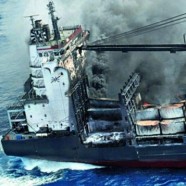Obama, Hollande and Elephants
Since early September the United States announced that they would carry out on October 8 the destruction of 5.4 tonnes of illegal ivory confiscated over the last 25 years on their soil. This destruction is in line with an Executive Order by President Obama on July 1, 2013 on Combating Wildlife Trafficking. In this light the United States has launched a national and international programme aimed at stopping “slaughter commissioned by armed and organized criminal Syndicates.” This constitutes a formidable task.
Hansa Brandenburg: another container ship riddled with Problems
On July 15th 2013 a fire broke out onboard the Hansa Brandenburg (IMO 9236236), a container ship 176 m in length with a capacity of 1,740 TEU (Twenty-foot Equivalent Unit) operating under the Liberian flag. The ship was sailing from Singapore to Durban (South Africa) and was located 200 miles off the coast of Mauritius. The crew of 17 was unable to extinguish the fire that continued to spread. Another container ship, the Donau Trader, deviated to rescue the crew and bring them safely to Port Louis in Mauritius. The burning ship drifted for several days until the fire was brought under control by Five Oceans Salvage and Smit Salvage on July 19th. The Hansa Brandenburg was towed towards Port Louis after permission was granted for assessment and potential repairs to be carried out.
Costa Concordia – Press Release #6
Press Release #6
Tomorrow, at any point during the hours-long raising of the wreckage, the cruise ship containing 50,000 tons of scrap, waste, and polluted water could split open like an old, cracked bathtub. While the Costa Concordia is now in a relatively confined area, tomorrow this dump could be spread out over the Island of Giglio, and the Mediterranean sea. The only reassuring thing is that the wreck has been drained of its propulsion fuel. For the past 19 months, the hull of the Costa Concordia has been subject to the corrosion caused by waves and offshore currents. Therefore, there is a pressing risk of pollutant dispersal.










